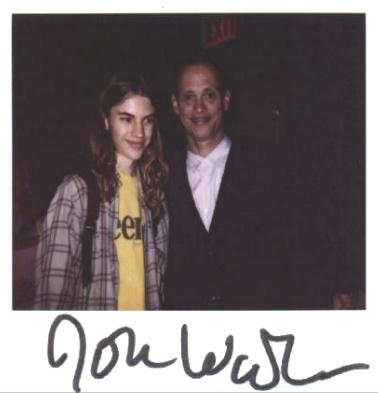
I first saw Pink Flamingos when I had just turned 14, and it changed my life. There was a sensibility to it and a humor that had existed only in my head before that, and seeing it externalized was a revelation. Its influence on my teenage life was enormous, and has a huge role in my sense of humor and who I am today. It’s also almost singularly responsible for my obsession with movies. Naturally, John Waters was my favorite filmmaker for years, and even now, I’d say no other artist is as important to me. So basically, devoting a month to watching his films (June Waters) was unnecessary because I had already seen them all, most of them multiple times. But it’s good for me to revisit those favorites every few years, and this was an excuse to do so, as well as revisit the ones I hadn’t seen so often, like his last two films (Cecil B. Demented and A Dirty Shame), and Hairspray, which had been too saccharine for me in high school, but I was now able to appreciate as one of his best works. I had also never watched each of his films in a short period of time, in order, which is always a fascinating way to explore the arc of a director’s career. So that’s what I did, starting from the surprisingly entrancing Mondo Trasho, and including every documentary made on Waters, special features, audio commentaries (his are among the greatest I’ve ever heard), and even some movies he didn’t direct that feature Divine or Edith Massey.
Other than a newfound appreciation of Hairspray, I don’t know that I really learned anything, but it was still very rewarding and great, and I will always love him dearly, and will continue to rewatch his films forever.
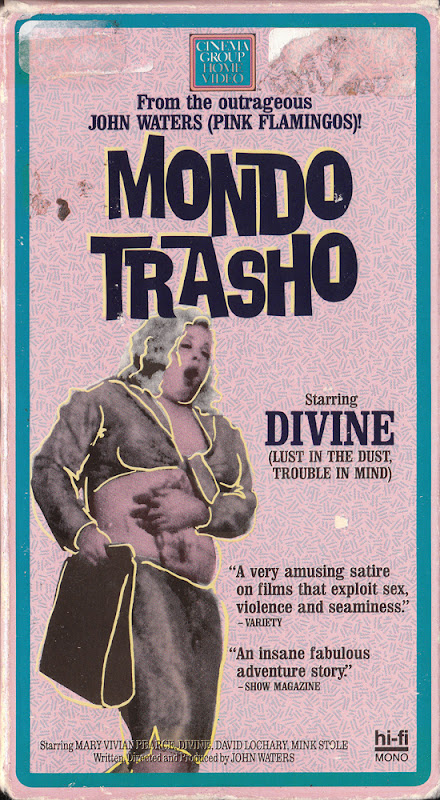
Mondo Trasho (1969) – 9.0
A woman (Mary Vivian Pearce) takes the bus to the park to feed bread to cockroaches, and ends up connecting with a shrimper, who sucks her toes for like ten minutes. She then gets hit by a car by Divine, who was distracted by a naked hitchhiker, and who puts her in the back of her car to take her somewhere. They end up in a mental asylum (someone’s apartment), where Mink Stole does an incredible topless dancing performance. But they’re able to escape with the help of the Virgin Mary, and Divine takes the still unconscious Mary Vivian Pearce to Dr. Coathanger (David Lochary), who cuts off Pearce’s feet and replaces them with monster feet. Which totally heals her, but then Divine gets stabbed and goes off to roll around, dying, in a pig pen. Pearce clicks her heels together, and is transported to a shopping district, where some high class women call her names. This is Waters’ first feature, and it’s essentially a silent film, with virtually no dialogue, and a constant trash-rock soundtrack. His cast, made up of his friends, all look interesting and amazing, and even when there are long stretches with not a lot happening, everyone is just fun to look at and admire. And the demented fairy tale of a plot is brilliantly bizarre. It’s likely not as exciting to someone who’s not a Waters enthusiast, but for me, it’s a treasure, and I absolutely love it.
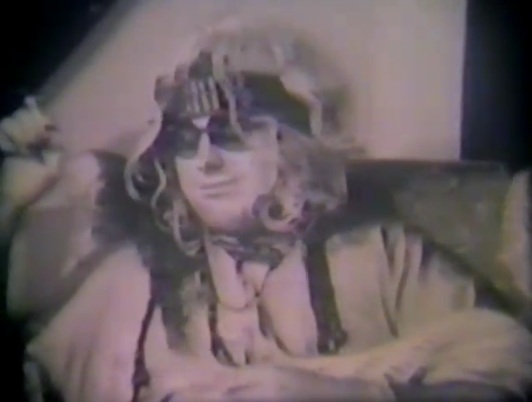
The Diane Linkletter Story (1970, Short) – 6.5
A loose, hypothetical reenactment of the final moments of radio and tv personality Art Linkletter’s daughter, made just days after the actual event. Two parents (David Lochary and Mary Vivian Pearce) wait for their daughter Diane (Divine) to come home, and discuss what kind of trouble she could’ve gotten herself into. Once she arrives, they fight, and then Diane jumps out the window and kills herself. Pearce and Lochary are pretty funny as the concerned parents, but Divine is surprisingly bland as the hippie daughter. It’s enjoyable enough, but certainly not great. There’s really just not much to it.

Multiple Maniacs (1970) – 9.0
Lady Divine (Divine) and Mr. David (David Lochary) run a tent show called the Cavalcade of Perversions, where people can pay to see perverted acts, like the puke-eater, armpit-lickers, and “actual queers kissing each other like lovers on the lips”, which is all just an elaborate ruse to rob people. Divine finds out Mr. David is cheating on her with a blonde named Bonnie (Mary Vivian Pearce), so she heads out to exact her revenge, but is raped in the street. She goes to church, where she meets the “religious whore” (an amazing Mink Stole), who fucks her with rosary beads while Divine imagines the crucifixion of Christ. Mr. David and Bonnie plot to kill Divine, and they all end up at Divine’s daughter (Cookie Mueller)’s house ready to kill each other. And then Divine gets raped again, this time by a giant lobster. It’s funny, bizarre, and shocking, but is also an intriguing portrait of insanity. Divine is a criminal psychopath from the beginning, but she descends throughout into deeper madness, and by the end, she’s completely lost control. Waters was still perfecting his talents here, as were his actors, but it still stands as a very sharp and entertaining film.
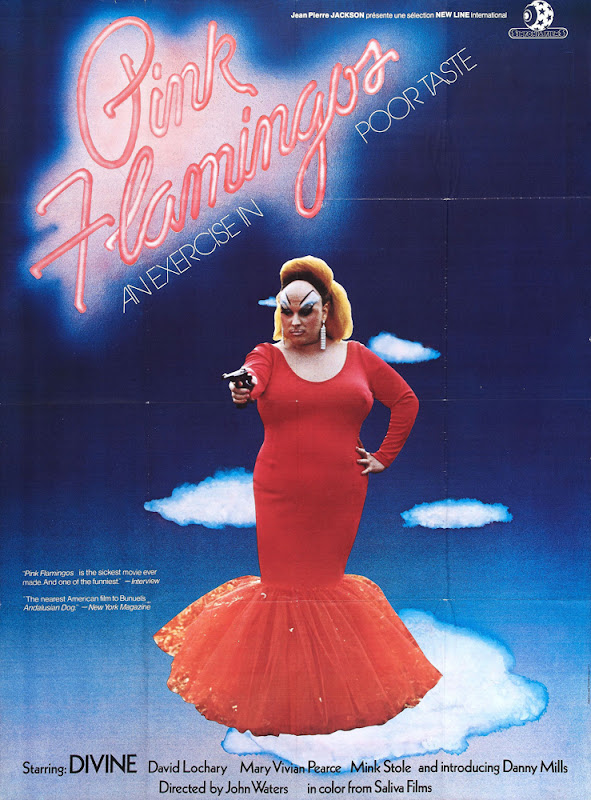
Pink Flamingos (1972) – 10.0
Divine and her family (Edith Massey, Mary Vivian Pearce, and Danny Mills) are the filthiest people alive, but Connie and Raymond Marble (Mink Stole and David Lochary) feel that they are actually filthier, so they wage a filth war against Divine. I watched this movie so often in high school that, even now, I find myself mouthing the words to every single line of dialogue. And yet, the deliveries are so fucking great that it still makes me laugh. The entire cast is amazing, all managing to give long and ridiculous diatribes in single takes (not to mention the various acts of filthiness they all go through), and Divine gives a truly devoted and intense tour-de-force performance. It also holds up amazingly well at being shocking and disgusting. It was far too influential on my life for me to ever be objective about it, but seriously, this is an incredible movie. I cannot believe it’s 40 years old.
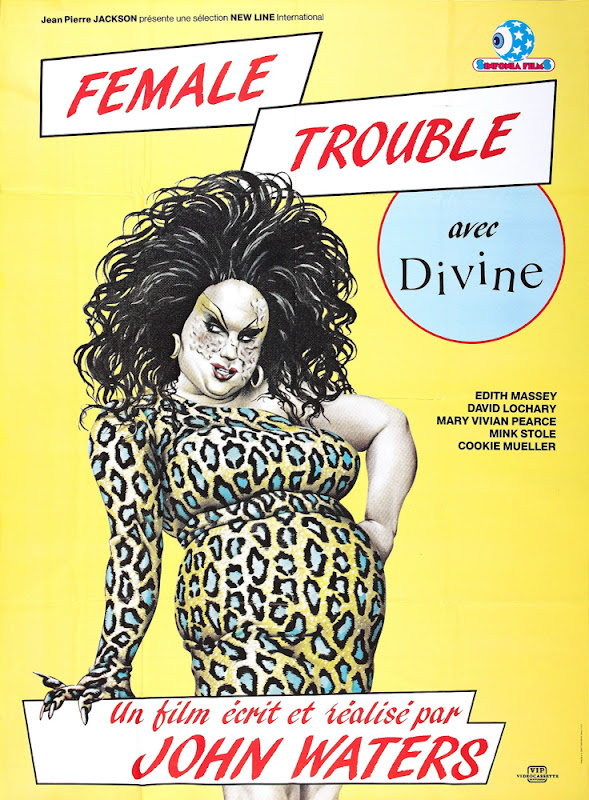
Female Trouble (1974) – 10.0
The life story of Dawn Davenport (Divine), starting from her days as a teenage delinquent who knocks a Christmas tree over on her mother and runs off to get fucked and impregnated by a greasy sleazester (also Divine). It moves on to her days as a thief and mother, when she starts going to a high-class beauty salon where she meets her husband Gator, who fucks her with household tools, and whose aunt Ida (Edith Massey) loathes heterosexuality and eventually throws acid in Dawn’s face out of spite. She also meets the sex-negative owners of the salon, Donna and Donald Dasher (Mary Vivian Pearce and David Lochary), who are fascinated by her criminal life and attempt to make her a “crime is beauty” fashion star. Dawn eventually takes things too far, though, and ends up in the electric chair, where she thanks all her fans as if she’s accepting an Oscar. A true star vehicle for Divine, who is brilliant as he transforms from catty teen to insane adult. Edith Massey is also hilarious as Aunt Ida, and Mink Stole gives one her best performances as Dawn’s daughter Taffy (and delivers what may be the greatest line of dialogue of all time (if you’ve seen it, you surely know it)). Vincent Peranio’s set design is amazing, and Van Smith has never been better with makeup and wardrobe. Pink Flamingos is tied as my favorite, because I appreciate it on some different levels, but Female Trouble is undoubtedly Waters’ best film. It’s truly remarkable.
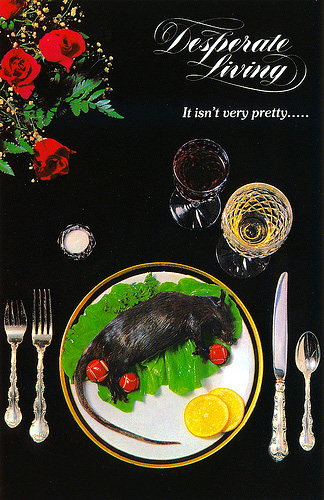
Desperate Living (1977) – 10.0
After killing her husband, the mentally ill Peggy Gravel (Mink Stole) and her obese maid (Jean Hill) flee the scene, and end up in the decrepit fairy tale town of Mortville, where they rent a room from a butch lesbian (Susan Lowe) and her girlfriend (Liz Renay). Even without Divine, this movie is overflowing with intensely over-the-top performances, particularly from the stellar Mink Stole and Susan Lowe. Edith Massey as Queen Carlotta, Mary Vivian Pearce as Princess Coo-Coo, and newcomer Jean Hill as Grizelda are also impeccable. The scene where Hill seduces Mink Stole is a mind-blowing vision of cinematic purity. One of the most dazzlingly creative and hilarious movies ever made, and probably the strongest opening ten minutes of any movie ever. A genius work, and one of Waters’ absolute best.
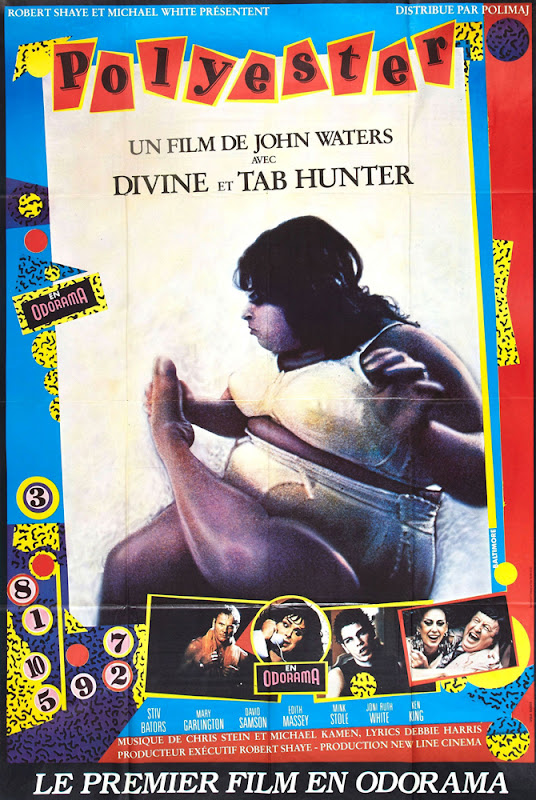
Polyester (1981) – 9.0
Francine Fishpaw (Divine) is a housewife with a miserable life. Her daughter is an energetic sex-starved abortion enthusiast who hangs out with a juvenile delinquent (Stiv Bators), her son is a glue-sniffing criminal foot-stomper, and her mean, porn-theater-operating husband is cheating on her with his secretery (Mink Stole in cornrow braids). The only person who is nice to her is her friend Cuddles (Edith Massey in maybe her funniest and most adorable performance). But things seem to be changing when she meets the handsome Todd Tomorrow (Tab Hunter), and they fall in love. But Tomorrow may have more malicious intentions. A hilarious, satirical melodrama, with reliably amazing and over-the-top performances from Waters’ cast. Amazing, with a clever gimmick (Odorama), and some timeless abortion humor.

Flamingos Forever (Screenplay) – 8.5
John Waters’ screenplay for the sequel to Pink Flamingos, that he was never able to film. Divine’s family returns to Baltimore, where they now have devoted fans who set them up in a house that caters to all their basest needs. But Connie Marble’s sister, Vera, wants to avenge her sister’s murder, and claim the Filth title for herself, along with her necrophile husband Wilbur, and kidnapped children, who are trained to indulge in bad behavior (smoking, shooting up heroin, ruining other kids’ birthday parties). This time, the Filth War escalates to epic proportions. There’s obviously a lot to live up to, and though it certainly tones down the shock value, and gross demands of the cast, it stays fairly true to the original film and its characters, is extremely funny, and incredibly weird (there are some flying turds). The best stuff is with the kids, who I think Waters always writes in really hilarious ways, but there are some definite highlights with Edie’s exploration of Communism, and Jean Hill’s character Velveeta Jones. Though it’s an unimaginable project in many ways, I think it actually would’ve worked, and it’s too bad it was never to be.
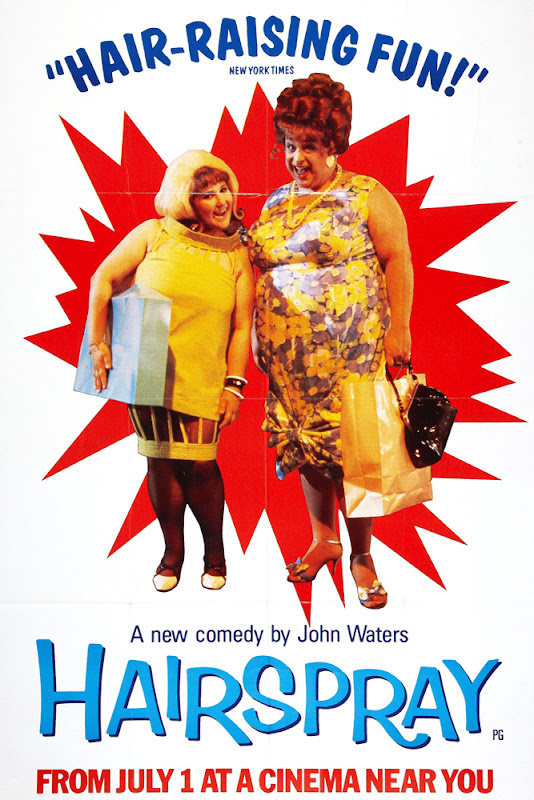
Hairspray (1988) – 9.0
Tracy Turnblad (Ricki Lake) is a big-haired teen in 1962 Baltimore who becomes a star on the local tv dance program, The Corny Collins Show, and fights for the show to integrate. Waters trades in filth for cuteness, but his humor remains sharp, distinct, and effective, and the lovingly told story is flawless. The music and the dance numbers are great, the whole cast is amazing (Divine as the hesitantly supportive mom may be one of his best roles), and it is just so fucking fun, and seriously adorable. Penny Pingleton, in particular, is one of the most adorable characters ever (the actress, unfortunately, never did anything else), and Lake is perfect as the bubbly, lovable lead. It’s amazing.

Cry-Baby (1990) – 8.0
Cry-Baby Walker (Johnny Depp) is a Drape (like a greaser), who falls for a Square (Amy Locane), and she attempts to enter his world of rock ‘n’ roll and juvenile delinquency. There’s great music and dancing, some funny bits, and some great, surprising moments of perversion. But mostly, it’s a great cast of characters, and a sweet, charming family dynamic. It’s not quite as funny, as shocking, or as cute as his best works (though it does deliver on each of those things in smaller doses), but it is still a delight. Fantastic mid-period Waters.

Serial Mom (1994) – 9.5
Kathleen Turner is a suburban housewife who appears to be overwhelmingly wholesome, but in fact, she scrapbooks about serial killers, makes obscene phone calls to a neighbor (Mink Stole) who once stole a parking space from her, and is murdering anyone who crosses her family. After killing people with anything from a fire-poker to a leg of lamb, she’s caught, and at her trial, finds that she’s become a marketable celebrity. Everything about this movie works. Particularly Kathleen Turner, who is fucking amazing. She plays it straight as a loving mom who doesn’t really comprehend that what she’s doing is wrong, and every subtle expression, and every line delivery is flawless. It’s one of the greatest, most brilliant performances of all time. It’s also just a great story, extremely funny, and perfectly encapsulates Waters’ obsession with criminality and courtrooms. Thematically, it’s very much a modern, mainstream counterpart to Female Trouble. And it’s a fucking wonderful, incredible film.
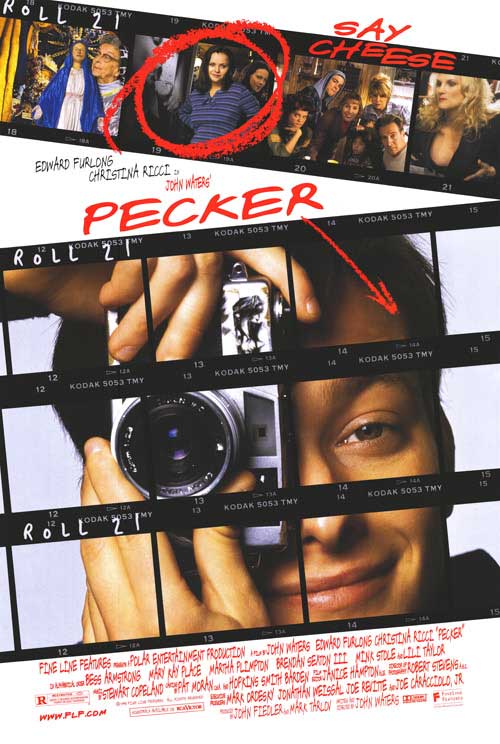
Pecker (1998) – 8.5
Edward Furlong is a young photographer named Pecker living in Baltimore, who takes photos of his family (including a grandma with a talking Mary statue and a little sister obsessed with sugar), friends (including Brendon Sexton III as a shoplifter, and Christina Ricci as his girlfriend obsessed with laundry), and the local eccentrics. A New York curator (Lily Taylor) discovers him, and gives him a show in the big city, but Pecker has trouble adapting to his newfound fame. Utterly charming, with a silly, gleeful soundtrack, and still enough weirdness to satisfy any Waters fan. Great fucking movie.
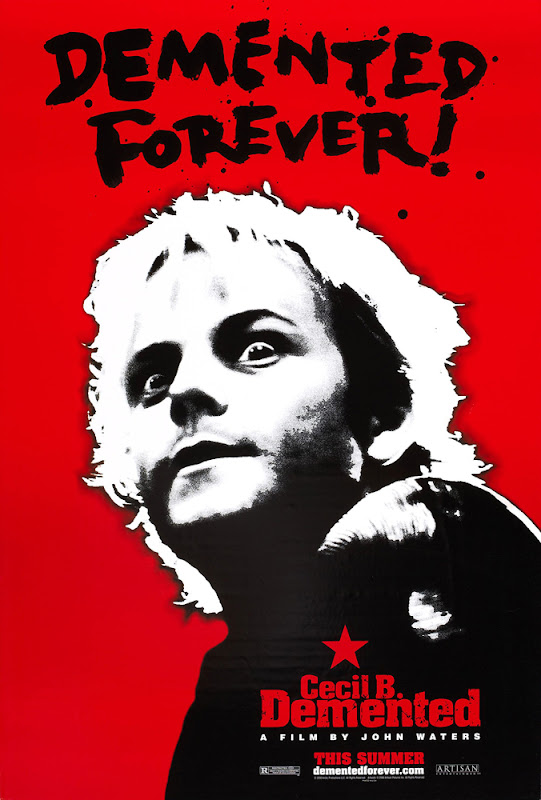
Cecil B. Demented (2000) – 6.0
Stephen Dorff leads a cult group of cinematic terrorists, and they kidnap movie star Melanie Griffith, and force her to star in their movie. At first, she’s reluctant, and committed to Hollywood, but soon becomes a devoted member of their family. Waters seems to be calling back to his earlier work, with outrageous characters and scenarios, but it doesn’t really work, I think largely due to glossier production values. It looks too good to convey true trashiness. And the actors are all professional actors. They’re emulating a style of campy and aggressive overacting that permeated Waters’ early films, but there’s no sincerity. The acting didn’t even need to be “good” back then (though I’d argue it often was), because the people looked the part. Even the ones who looked conventionally normal (like Mink Stole or Mary Vivian Pearce) had a dirtiness behind their eyes. You knew they were different, and they all embodied the characters effortlessly. Here, it almost feels like a group of well-meaning fans trying to make a John Waters movie, rather than an actual John Waters movie. Certain actors fare better than others. Dorff is fine as Cecil, as his character has the most depth and isn’t reduced to a one-note, jokey caricature like the multiple members of his film troupe, which there are way too many of. Alicia Witt is also good, as she seems to possess a genuine sleaze quality, and she’s also given a bit more to do (and has the film’s funniest lines with her story of being fucked by her entire family under a Christmas tree). And Michael Shannon stands out in a very small role, as he’s someone who would have actually fit in with Waters’ ‘60s and ’70s crowd.
It’s surprising that this film came only two years after Pecker, a film that, like all his films since Hairspray, was polished and somewhat mainstream, yet was still subversive and perverse in a very natural way. Cecil B. Demented does have good qualities. At its core, it shows a great love for cinema, which I certainly appreciate, it’s still very funny, and Van Smith does a great job with wardrobe and makeup. In particular, the makeup on Alicia Witt and Maggie Gyllenhaal toward the end is fantastic. Overall, I enjoy it. But it’s an unnatural film. I think it may be symbolic that Mink Stole is killed in the opening scene.
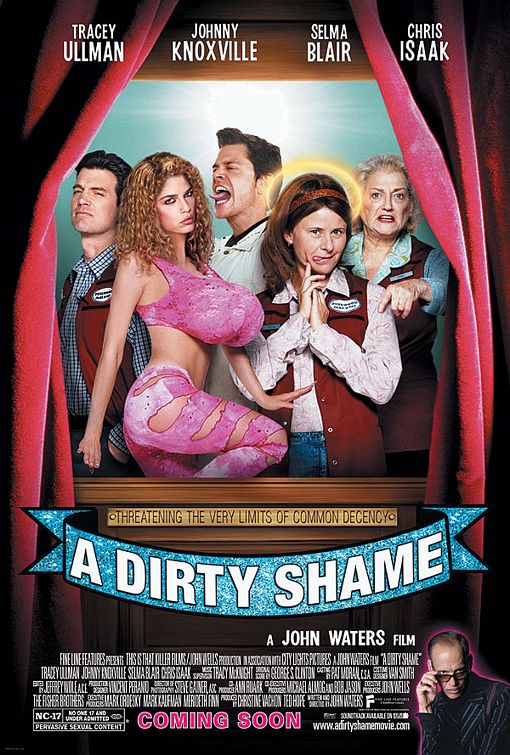
A Dirty Shame (2004) – 7.0
Tracey Ullman plays a prudish wife and mother who gets hit on the head and becomes a sex addict. Johnny Knoxville then introduces her to an underground group of sex fiends, each with their own distinct fetish, and explains that she may be the key to unlocking a brand new sex act. The humor is all very juvenile, with a lot of it being based around absurd sexual practices, or like a hundred euphemisms for cunnilingus. It was slapped with a ridiculous NC-17 rating, which it doesn’t even come close to deserving, and is especially unfair considering I’m not sure this movie ever needs to be seen by anyone over 17. It’s tailor-made for 15 year olds. I still like it, and it’s an improvement over Cecil B. Demented (and has much more genuine acting), but it’s a bit too dumb for me to completely embrace. I do appreciate the joyfulness of it, though. It knows it’s dumb, and celebrates it, which gives it some charm. And there are still lines in it that make me laugh, and aspects to it I really like. Selma Blair’s character is especially amazing. Overall, I’d say it’s Waters’ best film of the 2000s.
Here is my list of his films, ranked on Letterboxd.










